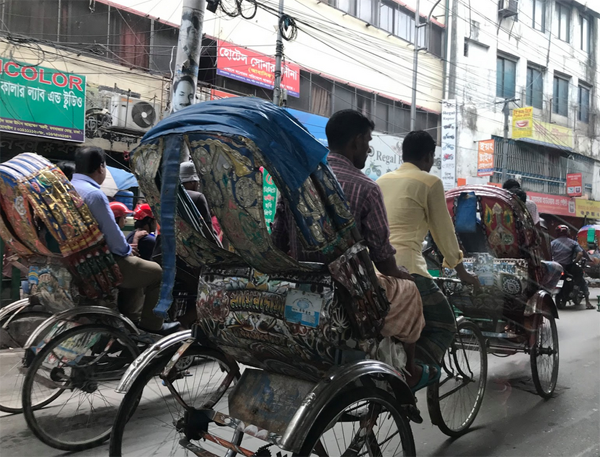Back to School
Sajjad Shaheb looks at his watch anxiously. The class is about to start. It is just fifteen minutes before six o'clock in the evening. He started from his office, which is located in Savar, at four thirty in the afternoon, almost half an hour before his work day usually ends. For the last three days he has received special permission from his boss* to leave early, as he has to attend a class.
Yes, Sajjad Shaheb has finally been admitted to a private university to study again after many years. He feels shy* about telling this to others openly, as it is a bit unusual to go back to studies when you are in your late forties. When people hear that, they give him a strange look. “What are you doing at university at your age?” they ask, raising their eyebrows*. This is the most common expression of surprise he receives when he shares this information. For this reason, he feels uncomfortable about telling people, even his relatives.
He also fears that he will not be able to complete his studies successfully, but since he has nothing else outside his work to do but his studies, he has come to a point of no return. In fact, he has no choice. He has to complete his Bachelor of Engineering* degree because the diploma* in Engineering that he had already completed is not enough to help him get a promotion in his work place. He already knows a lot in his own field, as experience has taught him a lot about his work. Many a time, Sajjad Shaheb finds that he can give very good advice to his immediate bosses who are actually younger than him in age, but have a higher position, because they already have a B.Sc engineering degree ‘in their bag’. Though he is skilled at his job, he does not have a degree, and this makes him feel inferior*. These younger people are junior* to him in age, but they are in a higher position, which makes him feel dissatisfied. It was this situation that pushed him to apply to a private university, and to his great pleasure, he was admitted.
It’s a university where there are opportunities for adults who have had a long gap in their studies to return to university and get their bachelor degrees. But he is finding that attending classes three days a week is really difficult. He was able to ask his boss if he could leave the office early, but at the same time he has to do this secretly, without his colleagues knowing. Otherwise, he is afraid that they may laugh at him and say unkind* things.

Class of adult learners. Photo by C. Brown.
When he enters the class after working at his office for the whole day, naturally he is tired. It is not easy to enter Dhaka city from a nearby city on a working day to attend class, the traffic is so heavy, and moving across the city is difficult. He always worries about being late, but he does not have any other option. Without this degree, he will not get a promotion, and without a promotion his salary will not increase. He badly needs the extra money to support his family. His parents are getting old, and they need medicine. They also need to visit the doctor regularly. Sajjad Shaheb’s daughter is growing up and she will be leaving middle school this year. His sister Shorna is going to get married next year, and some extra money is needed to cover the expense for that marriage. Sajjad Shaheb badly needs a higher salary. For that, he badly needs a promotion, and in turn, he badly needs to complete his degree. He has no other choice but to take the classes.
As he enters the classroom* at last, this thought gives him the extra energy he needs to forget his tiredness*. The charming English teacher is teaching from the grammar book in her hand. She is very smart, and she is also a lovely lady. She understands his situation, and gives him a smile. She doesn't mind his being a little late for class as she knows that her adult students are also working at jobs in other places and that they have to travel across the city to attend class. She knows the reality of traffic jams* in Dhaka city, so she ignores the late arrival of her older students, something which she usually does not do for her regular classes of younger students.

Busy Dhaka Traffic by C. Brown.
The teacher is friendly and understanding of her adult students, but still Sajjad shaheb finds it difficult to learn a foreign language at his age. It is not that he has not learned English before, but after a long gap in English language learning, it is a bit difficult for him to start learning again. The other classes in his engineering course are not so difficult for him to adjust to as he has been working in the field for a long time, but he is very aware of his “poor ” English. Oh! Yes! Of course the teacher tries her best to make it easy for them, but what are these strange words, and these strange things she is talking about? Oreo cookies, spaghetti, lasagna, General Motors, Porche cars, strawberries and blueberries, and what is this strange thing called a “blind date”? He has never heard of these things before in his whole life! It would be easier for him to learn English in his tired mind if those “English” names were in Bengali, or if the lesson described things that he already knew about, Shajjad Shaheeb wishes secretly. He would definitely find it easier if the words were Glucoose Biscuit, Pittha, Toyota car, jolpai , Kalo Jaam, or even Kamranga!
|
Kamranga (Star Fruit) and Jolpai (Olives) by K. Ridwana |
Pittha, by K. Ridwana |
Sajjed Shaheb came to know from his other senior classmates* that the next course, which is an English speaking course, is even more difficult than this grammar course. In the class he is taking right now, you just have to learn and write grammar in the exam script* and you can pass the exam easily, but the next class is really terrible, because the students have to speak in a foreign language in front of the whole class. Actually, he never had to speak in English in public in his entire student life before now, so he is beginning to feel really worried. What will happen if he speaks in his “Bangladeshi” accent*? Will his classmates judge him as being less smart than they are? Speaking in fluent English is a symbol of smartness* in society. How on earth will he pass that course? Sajjad Shaheb worries about the future, but whatever it is, he has to pass the exam. He has to succeed. So many people are relying on him.
The teacher reminds the students that tomorrow is the submission day for the final assignment of the semester* and they must not be late. Sajjad Shaheb is full of excitement and energy. He knows that if he submits a very good assignment, he will surely be able to get a good grade. He did not take his assignments seriously when he was a younger student, but now, as a mature student, he is very serious about his studies and understands the importance of getting good grades.
After class, Sajjad Shaheb starts for home. He is tired and hungry after his long day. It is already nine thirty at night and there is still a lot of traffic on the road. He is thinking of the assignment that he has to do after returning home.

Dhaka night traffic, by C. Brown
He needs to work on the computer and complete his assignment. When he is near his house, he suddenly remembers that his wife told him to bring his father’s medicine from the city pharmacy*. He also remembers that his mother told him that their supply of rice is almost all gone and he has to bring home some chaal. Otherwise, they will not be able to cook today’s dinner. Sajjad Shaheb puts his hand inside his pocket in search of his money bag. These days, it seems to be getting lighter and lighter. “Is there enough money inside?” This anxious thought makes him shrink* like a “lojjaboti lota”, which shrinks its leaves inwards if anyone touches it.

The lojjaboti lota plant, by K. Ridwana
He murmurs* silently in his own mind, “What is the highest priority right now, getting good grades or bringing essentials like food and medicine for my family members?” He has to choose between these two important options. It feels like the most difficult decision he has ever had to make, even more difficult than the assignment and exams that lie ahead of him.
_____
List of Bangla Words
Shaheb: Bangla word for ‘Mr.’
Savar: Name of a city near Dhaka - the capital
Chaal: rice; the staple /main food for Bangladeshi people
Jolpai: Olives
Kamranga: sour fruit / also called starfruit
Kalo jam: blackberry
Pittha: kind of pancake; a Bangladeshi local food
Lojjaboti lota: Shy creeper; shame plant; Mimosa
_____
Learning Activities
Vocabulary
High frequency words from the second 1000 General Service Word List. These words are very common in English, so you should learn any that you do not already know before learning the academic and off-list words below.
-
advice clock grammar pushed tomorrow afraid cook hungry regular uncomfortable afternoon dinner immediate reminds worry ahead dissatisfied information rice anxious engineering inside salary attend entire lesson search bag essentials (a) lot (of) skilled (a) bit (of/about) excitement medicine suddenly blind extra parents terrible charming gap pocket tired/tiredness
High Frequency words from the Academic Word List. These words are common in academic English. Learn these after you have learned the words in list one.
2.
| adjust | assignment | colleagues | definitely | final/finally | ignores | located | option | promotion | submission/submit |
| adult | aware | computer | energy | grade | job | mature | priority | relying | symbol |
*Off-list words. These words are less common in English. Only learn these words if you already know all the words in lists 1 and 2 above.
| accent | diploma | inwards | script | smart/smartness |
| bachelor | exam | jam (as in traffic jam) | semester | traffic |
| boss/bosses | eyebrows | junior | senior | unkind |
| classmates | fluent | murmurs | shrink | |
| classroom | inferior | pharmacy | shy |
Comprehension Questions
1. Remembering: What were the writer’s other priorities besides study and work? Why was he worried?
2. Understanding: What does the writer mean by the following expressions? (Use the context of the story to help you.)
- ‘in their bag’
- ‘raised eyebrows’
- ‘get a promotion’
- to be ‘smart’
3. Understanding: Why is it so important for Sajjad Shaheb to complete his university course? What might happen if he is not successful?
Critical Thinking Questions
1. Analysing: What is the difference between a degree and a diploma? Which one has the higher value, and why? How is the experience of studying at university different for older people and younger people? How is it the same? What causes those differences?
2. Applying: If you were Sajjad Shaheb, and you were almost home at the end of a long day, what would you do (would you go back to the city and get the medicine and rice, or would you go home and keep studying)? Give reasons, in English, for your answer.
3. Applying: If you are a young person, do you think you would like the chance to return to university as an older learner? Why/Why not? If you are an older person, and you have returned to study, what were your reasons for doing so? What would make it easier for older people to re-enter university (or high-school) and improve their educational level? How could this be made possible?
4. Evaluating: What do you think about the idea of older people, or even retired people, returning to university to continue their studies? Do you know an older person who has returned to university to study? If so, what subjects did they study? What difficulties did they face (that you know of)? In general terms, what might be the benefits (to society) of encouraging older people to continue their studies or return to university? What might be the drawbacks? What should be a person's first priority, family or study? Why?
5. Creating: Work in a small group. (Suggestion: your group size should be four or five people at most). Imagine you are the different members of Sajjad Shaheb’s family. He has come home late, and he forgot to bring the medicine and the rice that you need. Create a short play that shows this situation using the ideas and information from the story. Your play should describe everyone’s point of view clearly and should reach a solution that works for everyone. Write a script of what each person will say. Decide who each character will be. Practise your play, then perform it to your classmates. Try to do this without reading from your script. Publish your script so that others can read it. You could even create a video and make your play into a short movie.

